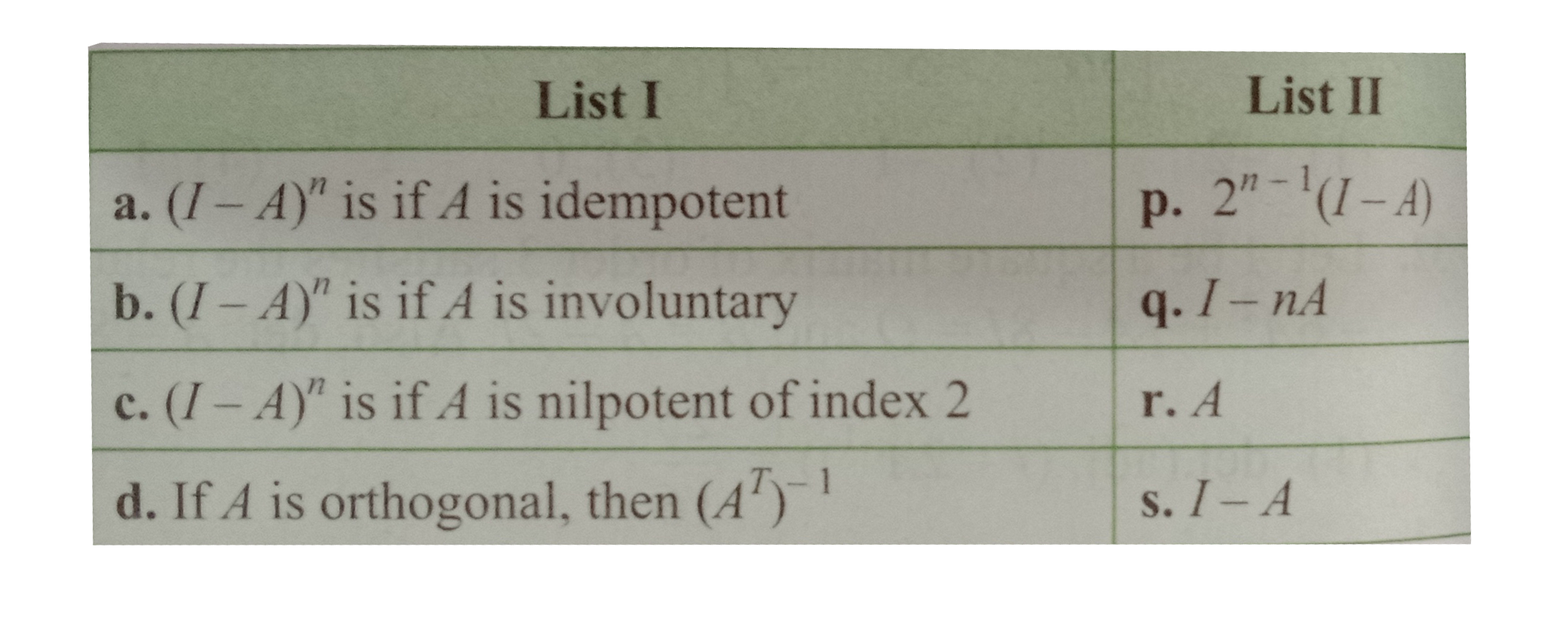Let A, B be two matrices different from identify matrix such that and is invertible for some positive integer n. If , then Solution in Tamil
is non-singular
is non-singular
is singular
is singular
Now, .
and .
If (I-A) is non-singular, then exists.
, this is contradiction the given condition.
Thus, is singular.
With similar reasons, is also singular.
Topper's Solved these Questions
- BOOK - CENGAGECHAPTER - MATRICESEXERCISE - Exercise (Comprehension)18videos
MATRICES
- BOOK - CENGAGECHAPTER - MATRICESEXERCISE - Exercise (Matrix)5videos
MATRICES
- BOOK - CENGAGECHAPTER - MATRICESEXERCISE - Exercise (Single)65videos
MATRICES
- BOOK - CENGAGECHAPTER - MATHMETICAL REASONINGEXERCISE - JEE Previous Year10videos
MATHMETICAL REASONING
- BOOK - CENGAGECHAPTER - METHODS OF DIFFERENTIATIONEXERCISE - Multiple Correct Answer Type7videos
METHODS OF DIFFERENTIATION
Similar Questions
Let a be a matrix of order 2×2 such that A2=O.
A2−(a+d)A+(ad−bc)I is equal to04:42View SolutionMatch the following lists :
 06:10View Solution
06:10View SolutionIf A is symmetric as well as skew-symmetric matrix, then A is
02:13View SolutionStatement-1: ~(p↔~q) is equivalent to (p↔q).
Statement-2: ~(p↔~q) is a tautology.01:38View SolutionEvaluate: ∫[√1+x2+x]n√1+x2dx
08:49View SolutionLet A,B be two matrices such that they commute. Show that for any positive integer n, ABn=BnA (ii) (AB)n=AnBn
03:50View SolutionIf a>bandn is a positive integer, then prove that an−bn>n(ab)(n−1)/2(a−b).
03:34View SolutionA and B are square matrices and A is non-singular matrix, then (A−1BA)n,n∈I' ,is equal to (A) A−nBnAn (B) AnBnA−n (C) A−1BnA (D) A−nBAn
02:56View SolutionIf A and B are square matrices of the same order and A is non-singular,then for a positive integer n,(A^(-1)BA)^(n) is equal to A^(-n)B^(n)A^(n) b.A^(n)B^(n)A^(-n) c.A^(-1)B^(n)A d.n(A^(-1)BA)
04:26View SolutionLet A, B be two matrices such that they commute. Show that for any positive integer n , ABn=BnA
03:54View SolutionLet A, B be two matrices such that they commute. Show that for any positive integer n , (AB)n=AnBn
04:38View SolutionIf A and B are two matrices such that AB=BA, then for every nεN (A) (AB)n=AnBn (B) AnB=BAn (C) (A2n−B2n)=(An−Bn)(An+Bn) (D) (A+B)n=nC0An+nC1An−1B+nCnBn
03:05View SolutionLet A and B be two matrices different from identify matrix such that AB=BA and An−Bn is invertible for some positive integer 'n'. If An−Bn=An+1−Bn+1=An+2−Bn+2, then
06:59View SolutionLet A, B be two matrices different from identify matrix such that AB=BA and An−Bn is invertible for some positive integer n. If An−Bn=An+1−Bn+1=An+1−Bn+2, then
03:58View SolutionLet A and B are two matrices such that AB=BA, then
for every n∈N03:06View SolutionLet A,B are two non singular matrices such that AB=BA3and B2=1 and An=I,(n∈N) then minimum value of n is (I is identity matrix) (A,B≠I)
03:16View Solution

